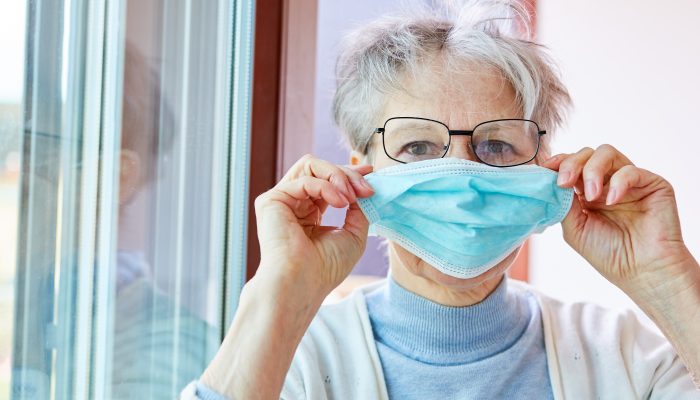COVID-19 is a pneumonia-like disease caused by a new coronavirus, named SARS-COV-2, that is similar to the Severe Acute Respiratory Syndrome (SARS) virus.
Since the pandemic broke out, it has been discovered that the seniors are at higher risk of contracting the Covid-19 virus than other segments of the population. The risk of contracting COVID-19 increases with age. This is because as we age, our immune system declines gradually. That makes us more susceptible to more severe illness.
As we grow older, the systems of our bodies will start having difficulty fighting off diseases. Not only does the body have difficulty fighting off new infections like Covid-19; it’s also more likely to be afflicted by chronic diseases that make the immune system weaker. It should also be noted that chronic diseases are more common with age.
As you get older, your risk for severe illness from COVID-19 increases. For example, people in their 50s are at higher risk for severe illness than people in their 40s. Similarly, people in their 60s or 70s are, in general, at higher risk for severe illness than people in their 50s. The greatest risk for severe illness from COVID-19 is among those aged 85 or older. Severe illness means that the person with COVID-19 may require hospitalization, intensive care, or a ventilator to help them breathe, or they may even die.
There are also other factors that can increase your risk for severe illness from COVID-19, such as having underlying medical conditions. Medical conditions including heart disease, lung disease, diabetes, cancer, and hypertension. By understanding the factors that put you at an increased risk, you can make decisions about what kind of precautions to take in your daily life.Because of the rapid spread of COVID-19, the CDC recently issued a warning for people who are at the highest risk for serious illness from the virus. It is imperative that seniors and others who are at high risk heed the advice of the CDC.
WHAT ARE THE SYMPTOMS OF COVID-19?
It is expedient, most especially for all caregivers of seniors to know the symptoms of the Covid-19 virus. This will also help to know how to take precautions, against contracting the virus.
The main symptoms of COVID-19 virus, which may appear between 2 to 14 days after exposure, can include: fever, cough, difficulty breathing or shortness of breath, chills, repeated shaking with chills, muscle pain, headache, sore throat, and new loss of taste or smell. Not everyone infected will show symptoms, or they may be mild enough that they are overlooked, but they can still be contagious. These symptoms can also seem similar to flu and seasonal allergies but there are some differences.
HOW DO YOU PREVENT YOUR LOVED ONE FROM COVID-19?
Here are some precautions families and caregivers can take to help their loved ones and themselves from being infected by the COVID-19:
– As a caregiver, you should wash your hands frequently with soap and water for at least 20 seconds before and after providing care, preparing food, using the bathroom, or touching surfaces in public places. You should also help your loved one practise the hand washing exercise.
– You should always keep your hands away from your face. Clean frequently touched surfaces in the home often, including mobility and medical equipment used by your loved one, such as walkers, canes and handrails.You should also advise your loved one to always keep his or her hands away from his or her face.
– You and your loved one should avoid crowds, and if you cough or sneeze, do so into the bend of your elbow or into a disposable tissue. Encourage your loved one to do the same safety tip.
– Practice physical distancing but not social isolation. One important way to lower the risk of the seniors catching COVID-19 is to limit in-person visits. But this may be tough for seniors who cherish spending time with friends and family members.
– Caregivers can help the seniors stay virtually connected if not socially or physically connected with their families and friends by showing them how to video chat with others using smartphones, laptops or tablets. Use apps on these devices to provide captions for adults with hearing challenges.
– If your loved one is feeling well, you can help to postpone unnecessary doctor visits or any non-essential doctor visit.
But in a case, where you have someone suffering from chronic illness, you can call in to the doctor’s office to ask if they offer tele-medicine which enables doctors and patients to communicate over video, email or other means rather than face-to-face. This will still help your loved one in a great deal to stay in touch with his or her doctor.
– You should advise your loved one to avoid travelling. Seniors should do away with non-essential travel especially cruises or trips with travel arrangements that would expose them to crowds.
– Since the seniors have very limited access to shopping or visiting the pharmacy, you should stock up enough groceries and other food items. Gather one to three months of medications, at least two weeks’ worth of food, over-the-counter remedies, and other essentials. This will help to reduce your loved one’s fear and anxiety. You should also make sure your loved ones eat rightly and stay hydrated to help sustain and improve their health conditions.
– You can also encourage friends and family living away from the elderly one, to telephone, write notes, send flowers or cards to lift your loved one’s spirits.
CONCLUSION
The impact of the COVID-19 virus on the seniors is greatly alarming. The seniors are especially vulnerable to severe illness from the virus more than the other age groups. Research is showing that adults 60 and older, especially those with preexisting medical conditions, especially heart disease, lung disease, diabetes or cancer are more likely to have severe, even deadly coronavirus infection than other age groups. The CDC has given guidelines to follow in order to reduce the impact of the disease on all age groups. Since the seniors are at higher risk of contracting the virus, their caregivers and families should endeavour to help them follow the laid down guidelines to reduce their vulnerability and chances of being infected by the COVID-19 virus.
REFERENCES
1. Centers for Disease Control and Prevention. cdc.gov
2. https://www.hopkinsmedicine.org/health/conditions-and-diseases/coronavirus/coronavirus-caregiving-for-the-elderly
3. https://www.vox.com/2020/3/12/21173783/coronavirus-death-age-covid-19-elderly-seniors
4. https://www.nfid.org/infectious-diseases/common-questions-and-answers-about-covid-19-for-older-adults-and-people-with-chronic-health-conditions/.


